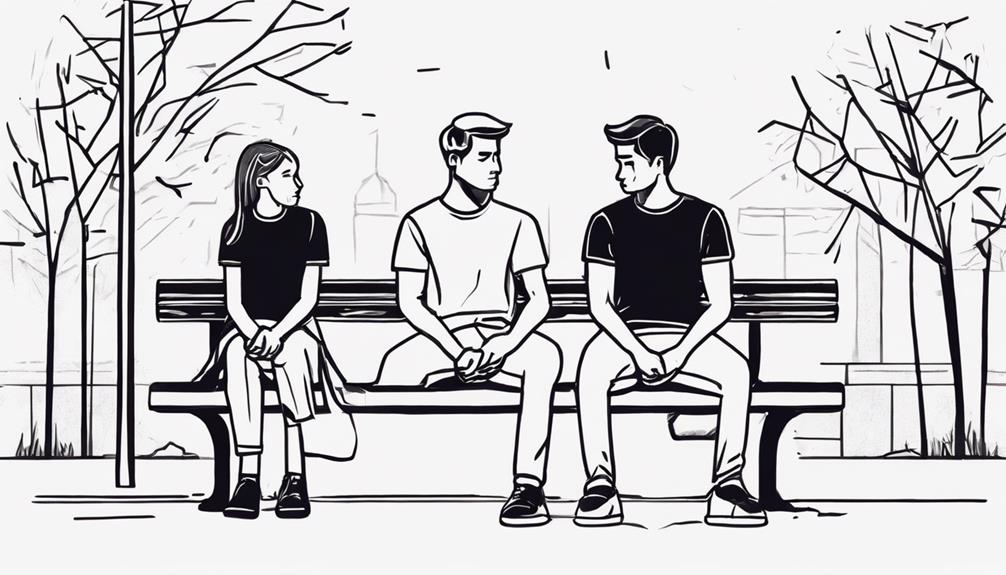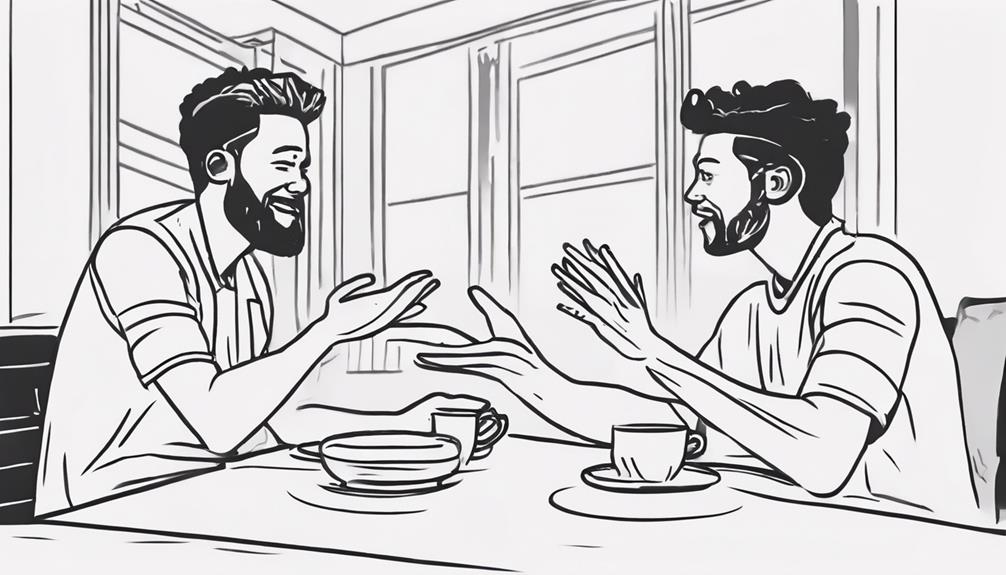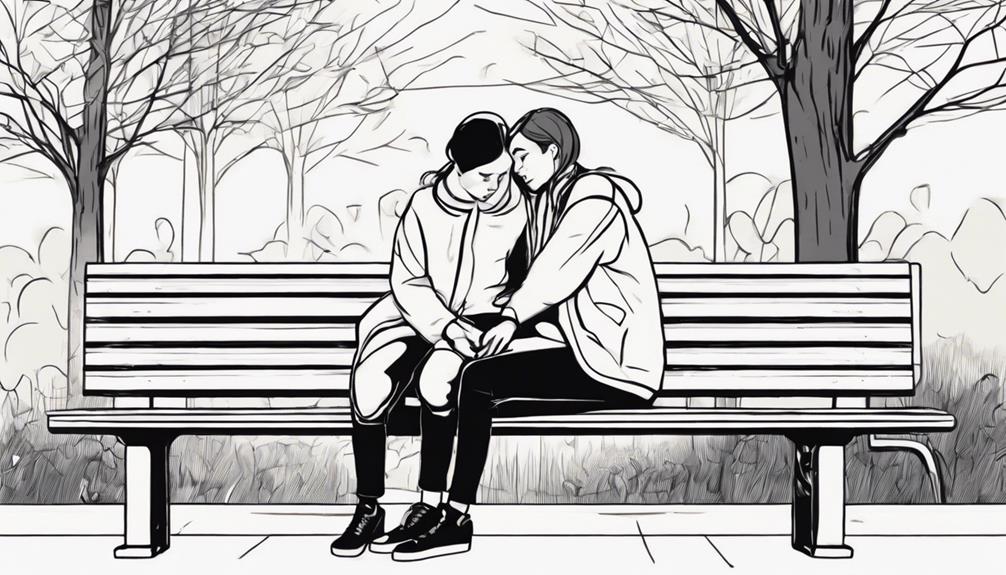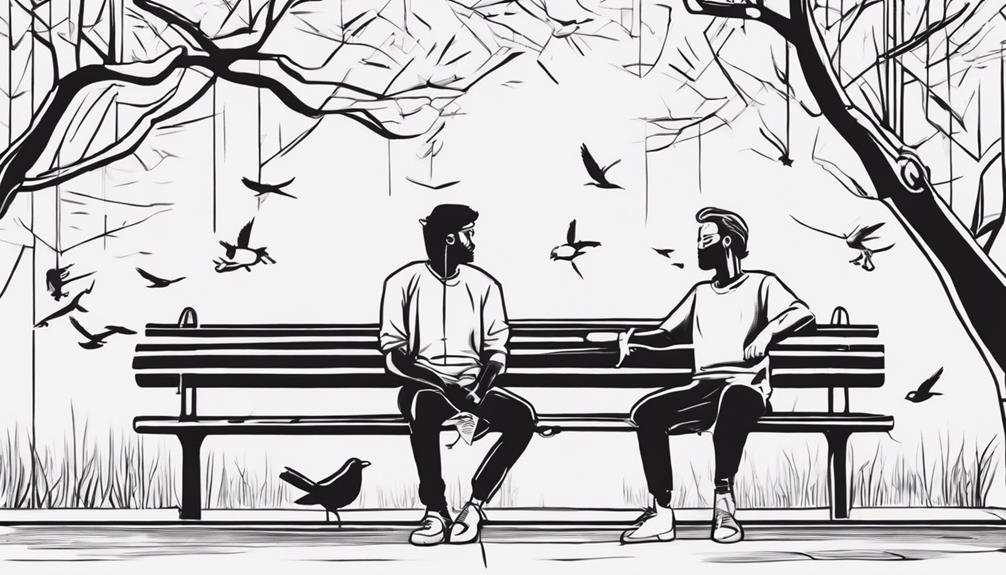Addressing disagreements with friends is a delicate process that requires finesse and understanding. It is essential to navigate these situations with care and respect to ensure the preservation of the friendship. By employing effective communication techniques and fostering an environment of mutual respect, individuals can work through conflicts in a constructive manner. However, the complexity of human relationships often reveals itself in how we handle these disagreements, prompting us to explore the intricacies of emotional intelligence and conflict resolution within friendships.
Key Takeaways
- Prioritize open and honest dialogue to deepen understanding and resolve conflicts effectively.
- Invest time in conflict resolution to strengthen the friendship bond.
- Collaborate on strategies to prevent misunderstandings and promote a healthy relationship.
- Use 'I' statements, active listening, and mutual respect to communicate and find common ground.
Prioritize Your Friendship

When faced with disagreements with friends, prioritizing the friendship is crucial for fostering mutual understanding and resolving conflicts effectively. Conflict resolution within friendships necessitates a delicate balance between expressing individual perspectives and valuing the relationship's overall well-being. By approaching conflicts with a mindset that values the mutual friend, individuals can work towards solutions that are considerate of both parties' feelings and opinions.
Engaging in open and honest dialogue is essential for navigating disagreements. Actively listening to your friend's viewpoint and expressing your own feelings can pave the way for a deeper understanding of each other's positions. Demonstrating a commitment to resolving conflicts not only underscores the importance you place on the friendship but also establishes a foundation of trust and empathy. Investing time and effort into conflict resolution not only addresses immediate issues but also strengthens the bond between friends, fostering a harmonious and enduring relationship built on mutual respect and understanding.
Address Competitiveness
Reflecting on the presence of competitiveness within a friendship can provide valuable insight into the dynamics at play and pave the way for constructive dialogue and resolution. It is essential to address competitiveness openly and collaboratively to maintain a healthy and supportive friendship. Here are some steps to address competitiveness with a friend:
- Reflect on whether the competition in the friendship is genuine or self-imposed to gain clarity.
- Initiate conversations with your friend about the competitive dynamic to address it openly.
- Collaborate to reframe the relationship positively and foster a supportive environment.
- Brainstorm solutions together to celebrate each other's successes without competition.
Handle Judgmental Comments

In the context of navigating interpersonal conflicts within friendships, addressing judgmental comments requires a strategic and collaborative approach to foster understanding and promote healthy communication dynamics. When faced with judgmental remarks, it is crucial to remain composed and provide specific examples to effectively address the conflict at hand. By focusing on concrete instances rather than making general accusations, a clear understanding can be established during disagreements. Encouraging open dialogue and actively seeking to comprehend each other's perspectives are essential steps in navigating judgmental comments within friendships. Collaboration on strategies to prevent similar misunderstandings in the future is key to fostering a more positive communication environment. Working together to find common ground and addressing the underlying issues behind judgmental comments in a constructive manner allows friends to find solutions together, strengthening the bond and promoting a healthier friendship dynamic.
Manage Conflicting Interests
Navigating conflicting interests in friendships requires a balanced approach that prioritizes mutual understanding and constructive collaboration. When managing conflicting interests with a friend, it is essential to:
- Acknowledge that differences in interests are natural and do not indicate personal animosity.
- Seek common ground through compromise and creative brainstorming to honor each other's perspectives.
- Focus on reaching agreements that are mutually beneficial for both parties involved.
- Respect the diversity in preferences and opinions, fostering an environment of mutual understanding.
In these situations, friends might encounter challenges in aligning their interests, but by maintaining open communication and a willingness to find solutions together, the bond between them can grow stronger. Embracing the opportunity for growth through effectively managing conflicting interests can lead to enhanced problem-solving skills and a deeper connection within the friendship.
Resolve Major Disagreements

When faced with major disagreements in friendships, a strategic approach centered on thoughtful resolution becomes paramount. It is crucial to evaluate the importance of the friendship and determine if the disagreement is a dealbreaker. Engaging in open and honest communication to address the root cause of major disagreements is essential. Both parties should seek to understand each other's perspective and express their feelings respectfully. Collaboration is key in this process, as friends should work together to find solutions that are mutually beneficial and promote a healthy relationship. Being open to compromise is important, but it is also necessary to consider whether the friendship may have run its course if resolutions prove consistently challenging. By finding solutions together and approaching disagreements with a constructive mindset, friends can navigate major conflicts and strengthen their bond through effective resolution strategies.
Navigate Being Caught in the Middle
To effectively navigate being caught in the middle of disagreements between friends, it is imperative to grasp the perspectives of all parties involved and maintain impartiality in facilitating communication and support. Understanding the viewpoints of each friend allows for a more nuanced approach in mediating the conflict, fostering open dialogue, and promoting resolution. When faced with this challenging situation, it is essential to communicate openly with both friends about your role and boundaries, emphasizing transparency and honesty throughout the process. Here are some key strategies to navigate being caught in the middle effectively:
- Understand the perspectives: Take the time to listen and comprehend the viewpoints of each friend involved.
- Communicate openly: Clearly express your position and limitations in the conflict to promote trust and clarity.
- Avoid taking sides: Refrain from making decisions for your friends and encourage direct communication between them.
- Offer support and empathy: Provide emotional support to both friends while maintaining a neutral stance in the disagreement.
Benefits of Social Skills Training

Social skills training plays a pivotal role in enhancing communication, conflict resolution, and relationship-building capabilities. By engaging in social skills training, individuals can develop crucial abilities such as empathy, active listening skills, and effective expression of emotions. These skills are essential for navigating friendships and resolving conflicts constructively. Moreover, social skills training can boost self-confidence, assertiveness, and adaptability in various social interactions, contributing to improved overall social functioning.
Individuals who undergo social skills training are equipped with the necessary tools to manage disagreements effectively and navigate complex social dynamics. Research indicates that individuals who have undergone social skills training tend to have better friendships, increased social support, and overall well-being. By honing these skills, individuals can foster stronger relationships, handle conflicts with friends more adeptly, and contribute positively to their social circles. Therefore, investing in social skills training can yield significant benefits in terms of friendship quality and conflict resolution within relationships.
Examine the Problem
To effectively address disagreements with friends, it is crucial to carefully examine the problem at hand. This involves identifying any underlying issues contributing to the conflict and communicating openly and honestly about them. By delving into the specific behaviors or actions that led to the disagreement, individuals can gain a better understanding of differing perspectives and work towards resolving the issue constructively.
Identify Underlying Issues
Through a systematic analysis of the interactions and circumstances surrounding the disagreement, one can effectively uncover the fundamental issues at play.
- Identify the root cause: Pinpoint the specific trigger that ignited the conflict.
- Examine behaviors: Scrutinize actions or statements that escalated tensions.
- Reflect on perspectives: Delve into individual viewpoints and motivations to understand differing standpoints.
- Consider past issues: Evaluate any unresolved matters or recurring patterns influencing the current disagreement.
Communicate Openly and Honestly
By engaging in open and honest communication, individuals can effectively examine the underlying problem causing disagreements with friends. Start by identifying the specific issue at hand to address it directly. Express your thoughts and feelings openly using 'I' statements to take ownership of your perspective. It is crucial to focus on the behavior or situation rather than resorting to personal attacks. Encourage your friend to share their side of the story, fostering mutual understanding. Open communication creates a clear pathway for resolving conflicts by allowing both parties to voice their concerns and perspectives. By communicating openly, individuals can work towards finding common ground and strengthening their friendship through understanding and empathy.
Lean Into Vulnerability

Embracing vulnerability in disagreements is crucial for fostering open communication, trust, and understanding in friendships. By being open about our emotions and thoughts, we create a space for genuine connections to flourish. This willingness to be vulnerable demonstrates strength and authenticity, paving the way for deeper empathy and more meaningful resolutions in conflicts.
Embrace Open Communication
Effective resolution of disagreements with friends often hinges on the willingness to engage in open communication, which involves embracing vulnerability and expressing one's thoughts and feelings honestly. Embracing open communication in disagreements allows for genuine conversations where issues can be addressed openly and worked on towards resolution. By being vulnerable, a safe space is created for honest dialogue and understanding between friends. Sharing true feelings and thoughts fosters deeper connections, paving the way for productive conflict resolution. Embracing vulnerability in communication can lead to increased intimacy, trust, and mutual respect in friendships.
- Genuine conversations fostered
- Safe space for honest dialogue
- Deeper connections formed
- Increased intimacy and trust
Foster Trust and Understanding
Engaging in open and vulnerable communication during disagreements with friends can serve as a foundation for fostering trust and understanding within the relationship. Demonstrating vulnerability in these situations allows individuals to share personal thoughts and emotions openly, leading to a more authentic and intimate connection with friends. This willingness to express vulnerability not only shows a level of trust but also strength in the relationship. Embracing vulnerability paves the way for honest conversations and a more meaningful resolution to conflicts. By incorporating vulnerability into disagreements, a safe space is created for mutual growth and enhanced communication skills. Ultimately, leaning into vulnerability during disagreements can deepen trust, strengthen friendships, and promote a deeper understanding between friends.
Use Inviting Language
To foster open and constructive communication during disagreements with friends, employing inviting language is paramount in creating a safe and respectful environment for both parties to express their perspectives. When using inviting language, consider the following:
- Use phrases like 'I value our friendship and want to understand your perspective' to invite open communication.
- Employ language that encourages your friend to share their feelings without fear of judgment or conflict.
- Avoid using accusatory or confrontational language to create a safe space for discussion.
- Phrase your thoughts in a way that invites your friend to express their side of the disagreement.
Protect Yourself From Fight or Flight

Navigating disagreements with friends requires a keen awareness of one's fight or flight responses and the implementation of grounding techniques to maintain emotional regulation and constructive communication. Recognizing when these responses are triggered is crucial in preventing impulsive reactions during conflicts. By practicing self-awareness, individuals can preempt emotional escalations that can further strain relationships. Taking deep breaths and pausing before responding allows one to calm the nervous system and approach the situation with a clear mind.
Grounding techniques, such as focusing on sensory experiences or using calming affirmations, help individuals stay present and avoid getting carried away by intense emotions. Prioritizing self-care and emotional regulation not only aids in navigating disagreements constructively but also safeguards one's well-being. By protecting oneself from the fight or flight response, individuals can engage in disagreements with friends more effectively, fostering healthier and more resilient relationships.
Reassess the Situation
When navigating disagreements with friends, it is crucial to reassess the situation with a logical and critical approach. This involves reflecting on differing perspectives, seeking common ground, and communicating openly and respectfully. By carefully evaluating the root of the disagreement and adjusting your approach accordingly, you can work towards resolving conflicts constructively.
Reflect on Perspectives
Upon encountering a disagreement with a friend, a crucial step towards resolution involves engaging in a process of introspection and empathy to reflect on their perspective and reassess the situation from a broader viewpoint. To effectively reflect on perspectives, consider the following:
- Analyze the situation from your friend's point of view.
- Delve into the context and circumstances influencing your friend's stance.
- Put yourself in your friend's shoes to understand the issue from their perspective.
- Evaluate your contributions to the disagreement through words or actions.
Seek Common Ground
To effectively navigate disagreements with friends, it is imperative to seek common ground by reassessing the situation, aiming to bridge differences and foster resolution through an understanding of shared values and perspectives. By reflecting on shared values, goals, or past positive experiences, individuals can find areas of agreement that serve as a foundation for resolving conflicts. It is essential to focus on understanding each other's perspectives to uncover underlying similarities and values that can lead to mutual understanding. Seeking compromises or alternative solutions that honor both parties' viewpoints is key in enhancing mutual understanding and collaboration. Ultimately, seeking common ground can shift the focus from conflict to cooperation, nurturing a more harmonious and respectful relationship.
Communicate Openly and Respectfully
In the process of handling disagreements with friends, effective communication that is open and respectful plays a pivotal role in reassessing the situation and paving the way towards resolution. When communicating openly and respectfully, consider the following:
- Express your feelings calmly and respectfully using 'I' statements.
- Listen actively to your friend's perspective to foster understanding and empathy.
- Avoid blaming or accusing your friend; focus on finding common ground.
- Create a safe space for open dialogue and mutual respect to effectively resolve disagreements.
Frequently Asked Questions
How Do You Resolve Conflict in a Friendship?
To effectively resolve conflict in a friendship, utilizing communication strategies and conflict resolution techniques is essential. Establishing open dialogue, practicing active listening, and collaborating on solutions are key components. Building trust through empathy and understanding enhances friendship dynamics. Implementing 'I' statements to express feelings constructively fosters a supportive environment. By employing these strategies, conflicts can be addressed and resolved, strengthening the bond between friends.
What Can You Do When You Have a Disagreement With a Friend?
When facing a disagreement with a friend, it is essential to engage in active listening and strive for mutual understanding. Assertiveness combined with empathy can pave the way for a productive conversation. Seeking compromise and focusing on finding common ground can lead to a resolution that benefits both parties. Maintaining a respectful and open-minded approach is key to preserving the friendship while addressing the disagreement effectively.
How Do You Deal With Disagreements?
In dealing with disagreements, effective communication skills, emotional intelligence, and conflict resolution strategies are crucial. Active listening and expressing oneself using 'I' statements can facilitate understanding. Seeking common ground and finding compromises are key to resolving conflicts constructively. By approaching disagreements with a rational and empathetic mindset, individuals can navigate differences in opinions or perspectives successfully, leading to strengthened relationships and mutual growth.
What Are the 5 Ways of Resolving Conflict?
Conflict resolution involves mediation techniques and strategies to address differences effectively. Communication skills play a pivotal role in understanding various perspectives, while compromise techniques help find common ground. Identifying the root cause of conflicts is crucial for long-term solutions. Active listening and expressing feelings through 'I' statements foster open dialogue. Collaborating and showing willingness to cooperate are key components for successful conflict resolution. These approaches can lead to positive outcomes in resolving disagreements.
Conclusion
In conclusion, navigating disagreements with friends requires prioritizing communication, understanding, and respect. Just as a ship adjusts its course to avoid rough waters, friends must adapt to differing opinions and perspectives to maintain the integrity of their relationships. By utilizing effective communication strategies and addressing conflicts with openness and vulnerability, friendships can withstand challenges and deepen in intimacy. It is essential to approach disagreements with friends as opportunities for growth and understanding, rather than obstacles to overcome.
